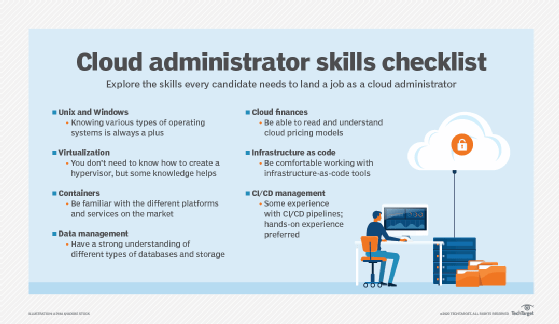
Creativa - Fotolia
How to become a cloud administrator
Although the cloud admin role varies from company to company, there are key skills every successful one needs. Explore seven areas of expertise and how they relate to this role.
Cloud computing is an attractive field to work in, with jobs that can pay well into the six figures. A cloud administrator is one such role, but becoming one isn't as straightforward as you might think.
Compared to other types of IT jobs, such as programming, it's difficult to find a cloud administration degree or take a boot camp to learn all of the skills required for the job. Instead, cloud administrators need to master several different fields and concepts.
What is a cloud administrator?
Broadly speaking, a cloud administrator plans, sets up and manages cloud-based workloads.
The term is a bit vague, and the specific day-to-day skills required may vary from one company to the next. At some organizations, cloud admins might design cloud architectures and strategies, while at larger companies those tasks are usually handled by a cloud architect.
Some cloud administrators may also have to do a fair amount of coding to manage their environments, while others rely primarily on GUI-based cloud administration tools -- especially if their cloud environments are relatively simple.
So, how do you become a cloud administrator with so much variation in the job description? There is a core set of skills to cultivate.

Unix and Windows
For starters, a cloud administrator should be familiar with both Windows-based and Unix-based computing environments. Cloud deployments often mix both types of operating systems, so admins might need to administer both Linux and Windows VMs running in the cloud.
In addition, cloud administration tools tend to span both types of operating systems. Many native cloud administration command-line interface (CLI) tools, like AWS CLI and gcloud CLI, behave a lot like traditional Unix-like tools. However, admins may have to run them on a Windows workstation to administer on-premises Windows infrastructure, so it's useful to be able to work with both OS families.
Virtualization
Virtualization is part and parcel of the cloud, as many workloads are hosted on VMs. Thus, understand how virtualization works and know the differences between major virtualization platforms, such as Hyper-V, VMware and KVM, to become a cloud admin.
This doesn't mean you have to be able to code a hypervisor from scratch. But, know what a hypervisor is, how it's different from a container and the performance implications of running a workload on a hypervisor instead of on bare metal.
Containers
Because container-based deployment platforms, like Docker and Kubernetes, have become so common within the cloud, it's important to learn this technology to become a cloud admin.
For example, understand when it does and doesn't make sense to use containers. Know the differences between on-premises Kubernetes and managed Kubernetes services like Amazon Elastic Kubernetes Service and Microsoft Azure Kubernetes Service. Learn how to define a container runtime and understand how to store data persistently for containerized applications, especially within the cloud.
Data management
Administering a cloud environment requires managing the data hosted within it. As a result, cloud administrators need core data management skills.
While you don't need to have a Ph.D. in data science, know what a database is and how relational databases compare to NoSQL databases. Understand the differences between object and block storage, especially as they pertain to cloud-based storage services. In addition to the essentials of data backup, know how to devise and manage a backup strategy for cloud data.
Cloud finances
The financial aspects of cloud computing are one of the most often overlooked, but critical, facets of cloud administration. Many organizations choose to run workloads in the cloud because they want to save money. One of a cloud administrator's key tasks is to deliver on that goal.
Understanding cloud finances means knowing the ins and outs of cloud providers' pricing models. Know what data egress and API requests mean, and how they factor into cloud bills. Understand the differences between pricing for serverless functions and cloud VMs, and be able to right-size a cloud VM instance to save money. Be familiar with the types of VM instances available on most public clouds, as well as different data storage tiers and how to use them to design and run a cost-effective cloud workload.
Infrastructure as code
Unless they really like manual, time-consuming tasks, admins will want to provision cloud environments automatically. To that end, be very familiar with infrastructure-as-code (IaC) tools, including those that run natively within public clouds, such as AWS CloudFormation, and those that are available from third-party vendors, like Ansible. Learn the security implications of IaC and how to minimize potential risks on those platforms.
CI/CD management
Along similar lines to IaC, an administrator might need to oversee a cloud environment that includes a CI/CD pipeline. Although this won't likely involve managing pipeline code, understand how a CI/CD pipeline works, which components factor into it and how to support a CI/CD pipeline -- whether it runs entirely in the cloud or includes both on-premises and cloud-based components.
How to gain cloud administrator skills
Because cloud administration requires such a wide and disparate set of skills, there is no single path to gain the necessary knowledge. Getting a degree in computer science or IT is a good start, but expect to learn some of these skills on your own time.
You'll also want to play around with different cloud platforms. Create trial accounts on AWS, Azure and Google Cloud to gain hands-on experience and learn the differences between each platform. Teaching yourself a bit of OpenStack and Kubernetes, which are important in private or hybrid cloud architectures, would also be a wise investment of time.
You can also seek a certification in cloud administration or a related field. Many common cloud certifications are tied to specific public cloud platforms, and don't demonstrate general proficiency in cloud administration. Nonetheless, a certification on one public cloud platform is still better than no certification at all.
Some general-purpose cloud administration certifications also exist, such as CompTIA Cloud+. The limiting factor is that they tend to be oriented toward entry-level cloud skill sets and jobs; they aren't a great fit for current IT professionals who want to land a more advanced position in the cloud field.








